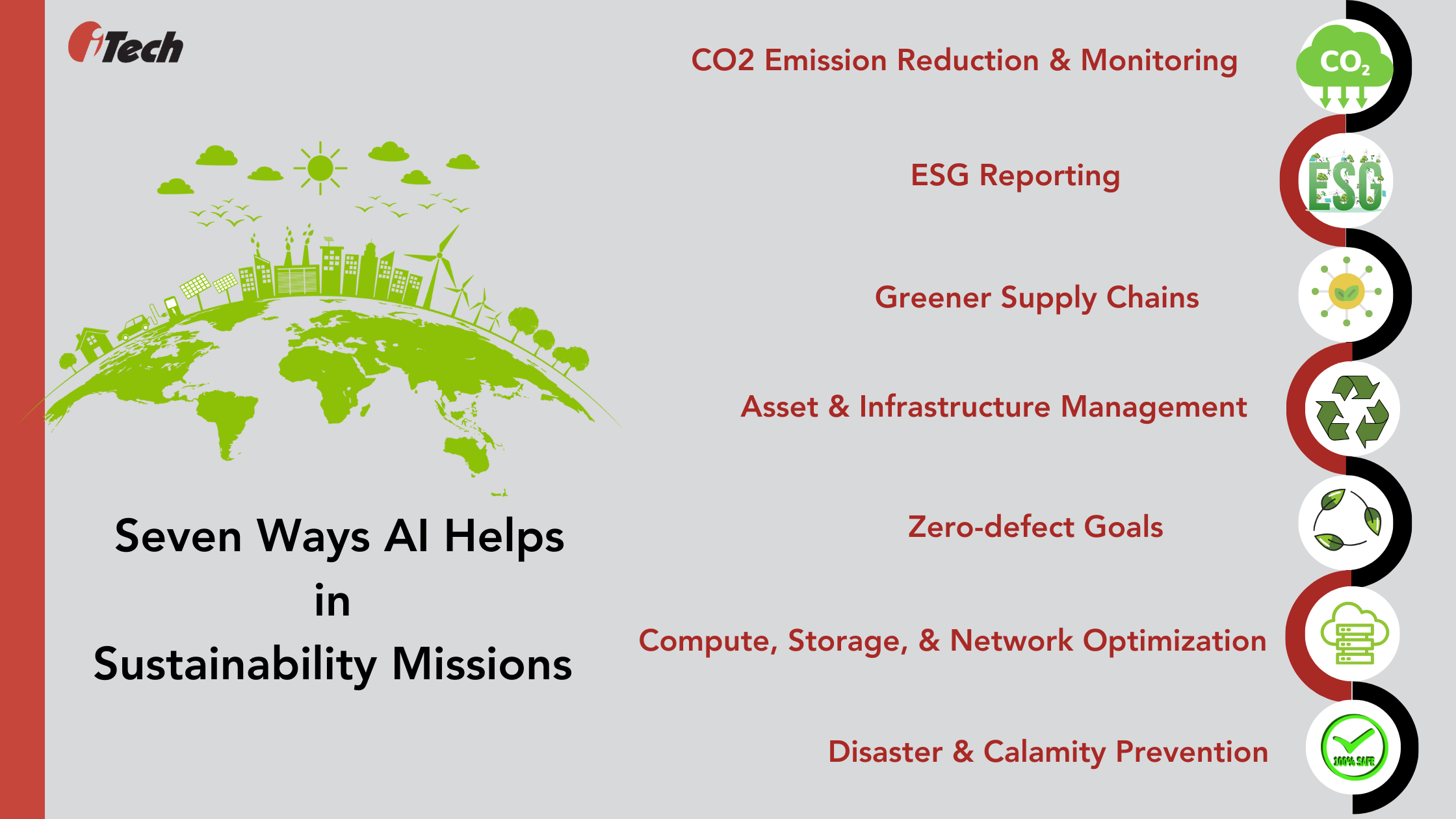AI and Sustainability Missions Go Hand in Hand!

AI and Sustainability
Recently, at COP28, AI was dubbed a powerful tool to combat climate change. Investors, regulators, businesses, and leaders announced several sustainability projects and financial commitments including AI-led initiatives, to reach net-zero goals by 2028. Many cutting-edge tools that leverage AI models and machine learning (ML) algorithms are already incorporated to identify and predict climate change patterns. AI methods are widely applied across industries to provide data and research-backed insights to help firms to achieve their ESG objectives. In summary, 2024 will be the year of AI and sustainability. Before exploring the unique coalescence of AI and sustainability, let us understand the global shift towards AI and the most recent GenAI tools like ChatGPT.
AI Beyond Novelty: The World View
AI was under the skeptics’ radar and every tech evangelist’s aspiration for decades. Its breakthrough unfolded in 2023, when the world was awash with geopolitical, technological, and economic turmoil. GenAI-based ChatGPT debuted with promises and job displacement fears. Despite many burning questions about ChatGPT’s ethical implications, leading tech giants channeled a smooth release of large language models (LLMs).
On the global regulatory front, countries like the U.S. released a blueprint of AI bill rights, and China rolled out a slew of targeted AI regulations that are touted to lay the foundation for its national AI laws. The UK, France, and Germany also enhanced their AI regulatory agreements and funding to leverage AI’s capabilities in healthcare and life sciences research. The EU announced its stance on AI transparency, accountability, and ethics with the AI Act and added amendments to establish a balanced, global AI ethical standard.
The global AI community expanded with several other notable developments, experimentations, and frictions.
According to the Forrester 2023 AI Pulse Survey, 67% of enterprises mentioned they embedded GenAI in their overall AI strategy. Another research from the IBM Institute for Business Value finds that 75% of CEOs believe businesses with the most advanced GenAI have the highest competitive advantage. Based on the AI predictions and ongoing trends, we can expect further breakthroughs such as smarter LLM releases like GPT-5, generative design, audio, video, and speech tools, multi-modal models, autonomous GenAI, and more.
We have collectively made it a reality that any business can easily embed AI into their processes, strategies, tools, and applications. Solutions such as OpenPages with Watson are examples of breakthrough that every organization has strived for in the past to simplify the scaling and operationalization of AI. OpenPages with Watson, built on IBM’s foundational models, easily augment manual efforts and daily workflows tied to governance, risk, and compliance (GRC). The tool is pivotal in helping enterprises practice AI governance to propel fair and ethical application of AI and AI-driven models. They can also help leaders understand their firm’s ESG risks better.
Our successful GRC projects with AI-led OpenPages solutions testify there is more to AI. Businesses need the support of the right transformation partners for AI-powered platform optimization for ESG reporting and other sustainability objectives. In the rest of the blog, we will go through the common use cases where AI and AI-powered tools can help drive a range of sustainability transformations:
AI and Sustainability: Seven Effective Use Cases

- CO2 Emission Reduction and Monitoring:
A research report by Boston Consulting Group (BCG) finds that AI has the potential to reduce 5-10% of emissions of greenhouse gases by 2023. The number is equivalent to the net annual emissions of the European Union. Another PwC study confirmed that AI use in environmental projects can contribute nearly $5.2 billion to the global economy. The use of AI models and techniques help accurately predict weather changes and monitor trends like global warming and carbon and greenhouse gas emissions. AI-led tools help analyze large-scale data to drive actionable insights and reports on environmental safety and protection. AI-powered platforms also enable the development of energy-efficient systems and technologies that help respond to modern sustainability challenges.
- ESG Reporting:
AI-powered technologies such as machine learning and predictive analytics help organizations keep track of their relevant ESG metrics and optimize resource usage. AI tools analyze large data volumes to determine social and corporate governance loopholes to promote inclusion and diversity. Additionally, AI-led technologies have massive potential to contribute to society and vulnerable communities by rolling out education, training, healthcare, and job placement initiatives.
Brands can analyze the growing consumer sensitivity towards sustainability, influencing their buying behaviors and achieving competitive differentiation by implementing appropriate ESG measures. AI tools also enable investors, banks, financial companies, and VC funding organizations to unearth a wealth of sustainability insights and ESG audits for ESG investments.
- Greener Supply Chains:
The scope of AI extends to helping businesses and manufacturers manage inventory and stock in transit by using inventory and route optimization insights to reduce potential wastages, damages, or losses and lower the carbon footprint across the supply chain value chain. AI tools can suggest sustainable practices to suppliers and stakeholders by analyzing and predicting trends in sales, inventory levels, customer behaviors, and other imminent risks.
- Asset and Infrastructure Management:
Every business or community project requires infrastructure and asset utilization. Businesses can avoid wastage and unethical and unsafe disposal of resources that can potentially harm the environment with AI solutions manage asset or infrastructure data and performance to guide businesses by predicting risks and resource usage trends.
- Zero-defect Goals:
Most manufacturing companies and businesses that produce end-products can leverage AI tools with image recognition capabilities to track material or input quality across the value chain to avoid producing defective products. AI makes it easier to catch anomalies or discrepancies, helping manufacturers avoid losses and wastage of resources and energy to achieve zero-defect goals.
- Compute, Storage, and Network Optimization:
AI-driven compute optimization, meaning AI algorithms that can analyze network, storage, and compute information, track historical data, and predict demand and usage spikes. It helps scale resources smoothly and intelligently optimize computing and cooling resources to improve overall efficiency, avoid network congestion, prevent outages, and save energy.
- Disaster and Calamity Prevention:
Foundational models built on environmental and geospatial data help power AI tools to predict natural calamities like floods, forest fires, droughts, and other disasters that have far-reaching impacts on life and property. Firms engaged in industries dependent on environmental factors like agriculture, food manufacturing, fresh produce distribution, retail, utilities, insurance, and financial services can use AI tools for model risk assessments.
AI and Sustainability will be the Future Protocol!
The use cases of AI and GenAI are broadening with time and development. All these sophistications matter when they help build and foster environmentally conscious societies, consumers, and businesses. Given the actual state of sustainability today, integrating AI in business decisions for environmental safety overrides profitability goals. Over time, meaningful AI and sustainability measures may avert mankind’s worse fears of collateral damage from climate change.
There are still several untapped areas around sustainability and climate where AI adoption is yet to flourish. For now, AI, particularly GenAI may be a tech equivalent of Cornucopia from Greek mythology. Thanks to ability to dispense textual, audio, and speech content, write codes, auto-generate low-code artifacts, and more. It’s time to join the collective mission to make AI sustainable for sustainability.
Get the conversations started. Contact our experts today for the latest information on iTech GRC AI-driven GRC solutions.
